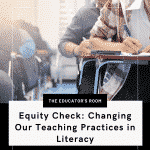Have you signed up for The Educator’s Room Daily Newsletter? Click here and support independent journalism!
As the leaves start to fall in the Lower Merion School District, many students are excitedly anticipating the celebrations that traditionally surround Halloween. However, a few days ago, the district informed parents that they had canceled the Halloween Parade across all of its elementary schools. The cancellation isn’t due to a pandemic but to a mix of reasons cited by the district.
Parents are frustrated, students are disappointed, and the district is on the defensive. As an educator, none of the school’s reasons resonate with me. I believe in inclusivity, strive for equitable classrooms, and firmly support safety in our schools. These are the reasons cited for the cancelation. Unfortunately, I think it’s a disservice to these values and a misguided approach. Ultimately, we can serve children better by building more opportunities rather than canceling existing traditions.
Canceling Traditions Does Not Equal Inclusivity
Some families do not celebrate Halloween for religious reasons. While many of these families keep their children home, others attend classes. What was the district’s answer to this quandary in the past? Make those kids sit in the library and wait until the parade ends.
Amy Buckman, the director of Lower Merion’s school and community relations, said, “Other kids would just be sitting in the library…and that does not help create a sense of belonging for children.” She’s right. That doesn’t create a sense of belonging. Why must that be the solution?
An exciting, unique activity could be something these children look forward to each year. Perhaps it’s a playful scavenger hunt around the school, searching classrooms they usually never explore. Or they could collaborate on an art project and display their creation for the school community to enjoy. Imagine two friends reuniting after the parade, excitedly sharing their experience from the day. That builds belonging, which creates a sense of inclusion. We can do better than a study hall in the library, and we can do better than just canceling an event.
Many parents in the district have expressed their longing for community and see Halloween as an opportunity, not a hindrance to inclusion.
Dominique Izbicki, the parent of a 7-year-old student in the district, says, “There are many different religions, cultures, and views that exist within our district. We seem to be taking the view of inclusivity as going down to the least common denominator rather than trying to celebrate all cultures, all religions, all views for our kids.”
Another parent, Christina Nicolosi, says, “If we’re talking diversity, equity, and inclusion, we should be including more, not cutting back. I feel like they’re missing a teachable moment…and maybe it would teach kids to be a little bit more sensitive and tolerant to their peers.” In many ways, parents are reflecting on inclusivity in a way that administrators of this district aren’t acknowledging. This same district hosts Chinese New Years celebrations, Diwali, and many cultural activities not celebrated unanimously among the student body. Why is Halloween different?
Canceling Traditions Does Not Equal Equality
Buckman also cites equality as a reason for the cancellation. Some parents can’t take time off work to attend. This reason resonates strongly but is still misguided. Buckman states, “There are some families for whom that’s really a hardship. They don’t have the type of jobs, or they don’t have the privilege of staying at home where you can just take a morning off without having a serious economic impact on your family.”
I fall firmly into this category. As a teacher, I’m rarely able to attend day events for my own children. They would love for me to be there. They are disappointed that I’m not there. However, school is a community, and there are many ways to participate in that community. Hosting additional evening and weekend events allow parents like myself to feel connected and included.
I know my children would love it if I could attend their daytime events, and I also know that they would never want those experiences eliminated. They have a great time anyway and include me in the fun when they get home, telling stories of the special day with giant smiles on their faces. Let’s create more opportunities for all parents to be involved at school, not take them away.
Canceling Traditions Does Not Equal Safety
The school district also cites safety as a leading catalyst for the cancelation. Historically, the events occur on large fields, which the district claims cannot be securely monitored.
Burkman says, “Just the thought of having an entire school population of young children in a field surrounded by adults that we couldn’t possibly screen was worrisome.” That implies two things: All large events must take place outside, which we cannot make safe; therefore, large community gatherings are no longer feasible.
Safety is a significant concern for everyone and deserves meaningful reflection. How can we keep our school children safe while maintaining a healthy sense of community? We must find an answer to this question that isn’t “cancel everything.”
In the short term, Lower Merion schools are equipped with large indoor gyms. October weather in Philadelphia is unpredictable as it is, and an indoor event would mean security checkpoints where the school could screen its attendees.
This Halloween, I will reflect with my students. We will discuss the importance of socially conscious costumes and how cultural appropriation impacts everyone. They will be educated participants in these festivities and understand that not everyone celebrates Halloween. We can and should allow Halloween celebrations as inclusive school communities. The misstep in Merion County is an opportunity for educators to reflect on how we truly engage in inclusion so that we can all have a happy Halloween and Fall season.
Editor’s Note: If you enjoyed this article, please become a Patreon supporter by clicking here.






